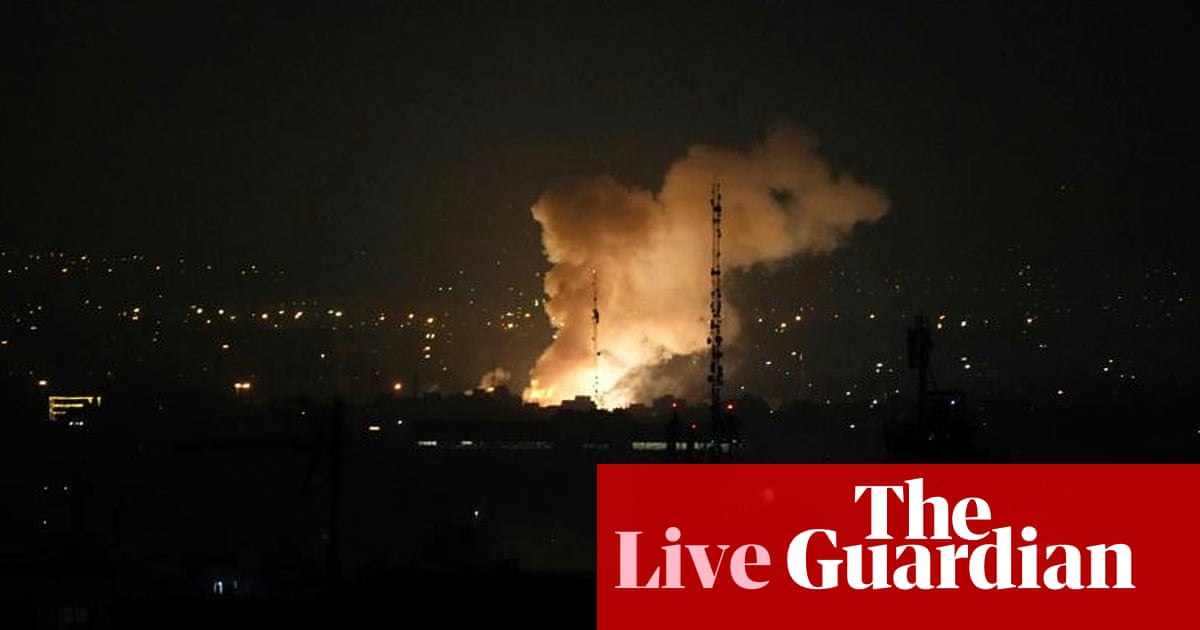The Israeli Air Force conducted strikes on Iran on Friday, multiple media reported.
Explosions were heard northeast of Tehran early on Friday, the state-run Nour News said, with videos shared online showing explosions in the capital
Earlier on Thursday, US and European officials were told that Israel was fully ready to launch a pre-emptive strike targeting Iran’s nuclear programme, even if Washington does not provide direct support.
The Trump administration had privately told Israel that it would not participate in a strike, according to Axios.
The White House did not have an immediate comment Thursday night.As the explosions in Tehran started, president Donald Trump was on the lawn of the White House mingling with members of Congress. It was unclear if he had been informed but the president continued shaking hands and posing for pictures for several minutes.
Israeli prime minister Benjamin Netanyahu has addressed the nation, saying the IDF had targted Iran’s leading nuclear scientists working on the Iranian bomb.
He said that Iran’s main enrichment facility in Natanz had been targeted.
Iranian media say several residential areas in Tehran have been hit, causing fire.
Iran has suspended all flights at its main Iman Khomeini airport, state TV says.
Meanwhile,Israelhas closed its airspace for arrivals and departures until further notice, the Transportation Ministry says.
The Israeli military has said it has completed the first stage of strikes that included attacks on dozens of military targets, including nuclear targets in different areas of Iran.
In a statement, the IDF said “Weapons of mass destruction in the hands of the Iranian regime are a threat to the State of Israel and a significant threat to the entire world. The State of Israel will not allow a regime whose goal is the destruction of the State of Israel to possess weapons of mass destruction.”
In announcing the operation againstIran, the IDF has claimed that Iran has enough enriched uranium to build several bombs, and it needs to act against this “imminent threat.”
An Israeli military official saidIsraelwas striking “dozens” of nuclear and military targets. The official said Iran had enough material to make 15 nuclear bombs within days.
On Thursday, the International Atomic Energy Agency issued its strongest condemnation of Iran in 20 years as it said the country had continued to enrich uranium to near weapons-grade levels and hadfailed to comply with its nuclear nonproliferation obligations.
Iran immediately announced it would establish a third enrichment site in the country and swap out some centrifuges for more-advanced ones.Israel for years has warned it will not allow Iran to build a nuclear weapon, something Tehran insists it doesn’t want.
US senator Lindsey Graham, a Trump ally and supporter ofIsrael, has tweeted “Game on”.
An Israeli military official has told Reuters that the air force is striking “dozens” of targets across Iran, including military and nuclear sites.
The official has called the Iranian nuclear programme is an existential threat to Israel.
Speaking to i24 diplomatic correspondent, Amichai Stein, an Israeli military official said that the country was preparing for “days of battle” with Iran.
State TV inIranhas said air defences are on full alert amid reports of explosion in the capital Tehran.
Holly Dagres from the Washington Institute has said that reports of strikes are concentrated around north Tehran.
CNN has reported that Donald Trump has convened a cabinet level meeting, as US official told multiple media thatIsraelhas begun carrying out strikes on Iran.
The officials said there was no US assistance or involvement in the operation. The officials, who spoke on condition of anonymity, declined to provide further information.
The Israeli Air Force conducted strikes on Iran on Friday, multiple media reported.
Explosions were heard northeast of Tehran early on Friday, the state-run Nour News said, with videos shared online showing explosions in the capital
Earlier on Thursday, US and European officials were told that Israel was fully ready to launch a pre-emptive strike targeting Iran’s nuclear programme, even if Washington does not provide direct support.
The Trump administration had privately told Israel that it would not participate in a strike, according to Axios.
The White House did not have an immediate comment Thursday night.As the explosions in Tehran started, president Donald Trump was on the lawn of the White House mingling with members of Congress. It was unclear if he had been informed but the president continued shaking hands and posing for pictures for several minutes.
Israel’s Defense MinisterIsraelKatz has announced a “special situation” in Israel after the country launched strikes on Iran. Explosions have been heard northeast of Iran’s capital Tehran according to, the state-run Nour News.
Katz said schools would be closed in the country on FridayThere was no immediate word on what was struck.
We’ll bring you more information as it arrives.
